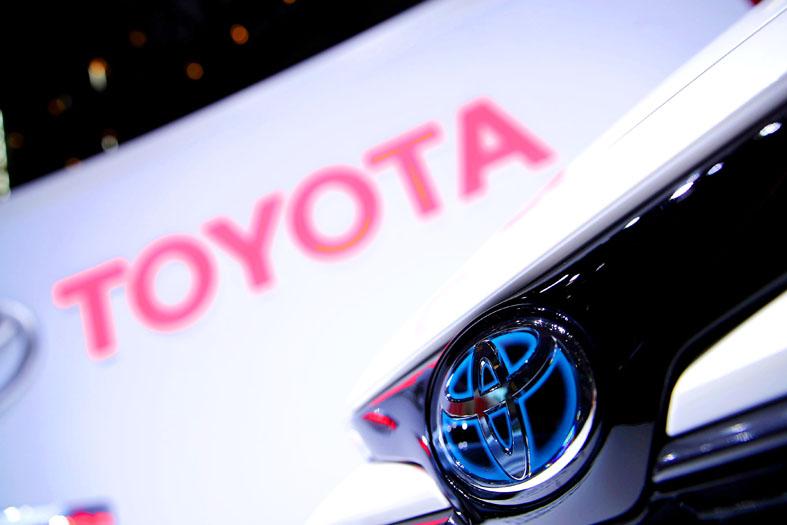Toyota Motor Corp, Nissan Motor Co, Honda Motor Co and other Japanese automakers yesterday scrambled to assess the production impact of a fire at a Renesas Electronics Corp automotive chip plant that could aggravate a global semiconductor shortage.
“We are gathering information and trying to see if this will affect us or not,” a Honda spokesman said.
Other automakers, including Toyota and Nissan, said they too were assessing the situation.

Photo: Reuters
The effect on automakers could spread beyond Japan to other auto companies in Europe and the US, because Renesas has about a 30 percent global share of microcontroller unit chips used in vehicles.
Renesas said it would take at least a month to restart production on a 300mm wafer line at its Naka plant in northeast Japan after an electrical fault caused machinery to catch fire on Friday and poured smoke into the clean room.
Two-thirds of production at the affected line is automotive chips. The Naka plant also has a 200mm wafer line, which has not been affected.
Concerns on the effects of the fire on production sent auto shares sliding, with the big three — Toyota, Honda and Nissan — closing down more than 3.3 percent.
Renesas shares tumbled as much as 5.5 percent and ended 4.9 percent lower. The benchmark TOPIX shed nearly 1 percent.
“It will probably take more than a month to return to normal supply. Given that, even Toyota will face very unstable production in April and May,” Tokai Tokyo Research Institute senior analyst Seiji Sugiura said. “I think Honda, Nissan and other makers will also be facing a difficult situation.”
Semiconductors such as those made by Renesas are used extensively in vehicles, including to monitor engine performance, manage steering or automatic windows, and in sensors used in parking and entertainment systems.
Nissan and Honda had already been forced to scale back production plans because of a chip shortage resulting from burgeoning demand from consumer electronic makers and an unexpected rebound in vehicle sales from a slump during the early months of the COVID-19 pandemic.
Toyota, which ensured parts suppliers had enough stocks of chips, has fared better so far.
“It could take three months or even half a year for a full recovery,” said Akira Minamikawa, analyst at technology research company Omdia.
“This has happened when chip stockpiles are low, so the impact is going to be significant,” he added.
Renesas said that its customers, which are mostly automotive parts makers rather than the auto companies, would begin to see chip shipments fall in about a month.
The company declined to say which machine caught fire or which company made it.
The Japanese government promised help for the auto industry.
“We will firmly try to help the Naka factory achieve swift restoration by helping it quickly acquire alternative manufacturing equipment,” Chief Cabinet Secretary Katsunobu Kato told a regular news conference yesterday.
The incident at the Naka facility came after an earthquake last month shut down production for three days and forced Renesas to further deplete chip stocks to keep up with orders.

South Korea’s equity benchmark yesterday crossed a new milestone just a month after surpassing the once-unthinkable 5,000 mark as surging global memory demand powers the country’s biggest chipmakers. The KOSPI advanced as much as 2.6 percent to a record 6,123, with Samsung Electronics Co and SK Hynix Inc each gaining more than 2 percent. With the benchmark now up 45 percent this year, South Korea’s stock market capitalization has also moved past France’s, following last month’s overtaking of Germany’s. Long overlooked by foreign funds, despite being undervalued, South Korean stocks have now emerged as clear winners in the global market. The so-called “artificial intelligence

NEW IDENTITY: Known for its software, India has expanded into hardware, with its semiconductor industry growing from US$38bn in 2023 to US$45bn to US$50bn India on Saturday inaugurated its first semiconductor assembly and test facility, a milestone in the government’s push to reduce dependence on foreign chipmakers and stake a claim in a sector dominated by China. Indian Prime Minister Narendra Modi opened US firm Micron Technology Inc’s semiconductor assembly, test and packaging unit in his home state of Gujarat, hailing the “dawn of a new era” for India’s technology ambitions. “When young Indians look back in the future, they will see this decade as the turning point in our tech future,” Modi told the event, which was broadcast on his YouTube channel. The plant would convert

‘SEISMIC SHIFT’: The researcher forecast there would be about 1.1 billion mobile shipments this year, down from 1.26 billion the prior year and erasing years of gains The global smartphone market is expected to contract 12.9 percent this year due to the unprecedented memorychip shortage, marking “a crisis like no other,” researcher International Data Corp (IDC) said. The new forecast, a dramatic revision down from earlier estimates, gives the latest accounting of the ongoing memory crunch that is affecting every corner of the electronics industry. The demand for advanced memory to power artificial intelligence (AI) tasks has drained global supply until well into next year and jeopardizes the business model of many smartphone makers. IDC forecast about 1.1 billion mobile shipments this year, down from 1.26 billion the prior

People stand in a Pokemon store in Tokyo on Thursday. One of the world highest-grossing franchises is celebrated its 30th anniversary yesterday.